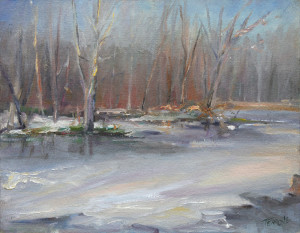 I’ve been teaching for some time now and this topic keeps coming up. How important is intuition. I’ve had many students over the years who resisted learning more about their art for fear of having their intuition inhibited. Having traveled this road myself, beginning as an abstract painter, I have come to the conclusion that we only hinder our chances of success when we fall into this trap.
I’ve been teaching for some time now and this topic keeps coming up. How important is intuition. I’ve had many students over the years who resisted learning more about their art for fear of having their intuition inhibited. Having traveled this road myself, beginning as an abstract painter, I have come to the conclusion that we only hinder our chances of success when we fall into this trap.
I grew up in a time where expression overruled foundation. I’ve had to struggle to learn what I should have known from the beginning. I believed that I could just sit down and the art would flow from my fingertips. Why should I think such a thing. To imagine that I could produce good art on a repeat basis, without understanding the basic foundation principles, is somehow laughable to me now. I would not expect to pick up a violin and begin to play a concerto without years of training. Why do so many of us visual artists assume we can produce works of art without paying our dues, without knowing basic concepts. I remember discovering that color had temperature way to late in my career and being amazed what that concept meant to the landscape painting I was attempting to do.
Intuition is certainly a key aspect of creativity. Without it we are mechanical to a fault. We create uninspired art. But to what degree do we allow intuition to rule our work. I’ll leave you with a quote from Edgar Degas, ” Painting is easy when you don’t know how, but very difficult when you do” What’s your opinion?


Joe I completely agree with you. It’s important to have a solid understanding of fundamentals of landscape painting. That’s exactly what I’m teaching students right now in my class!
Thanks for your reply Pratima. I find many students who have been painting a long time don’t want to upset the apple cart and would prefer to continue in the vein they have been following for years. I also find that beginning painters are willing to learn but are insecure or embarrassed to take classes. I make it a point to tell all my students and my potential students that this is a journey and it is our own journey. If we put in the time and energy we grow at our own pace. As long as we see growth we are successful. Its so hard not to shut down from the competitive aspect of our work. And as a result it is so important to arm ourselves with the tools and skills we need to grow.
As in any other field, one needs to learn the tools to use and the skills necessary to begin the journey. With painting there are so many variables to understand before one begins to master the art.
Thanks Natalie. Your so right. I thought I knew so much until I really started to learn. Then I realized I new nothing. At this point I am quite sure I never know it all.
Joe: great insight. I would reference for you Malcolm Gladwell and his book “Outliers: The Story of Success”. In that book, amongst other things he hypothesized that it takes 10,000 hours of work to master any subject or discipline. Within my own career I have seen that hypothesis proven time and time again. We enable our intuition and our creativity when we’ve mastered our craft
Thanks Sam for the response. I totally agree. Without the tools it’s difficult to express that creativity effectively to others.
And you, Joe, taught me the “knowledge” that my long abstract way of painting lacked. My painting is richer, more varied, AND I feel like I am playing my own violin now.
You play it quite well. Your a very dedicated painter and it shows.